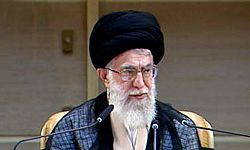The Leader of Ummah and Oppressed People Imam Khamenei Advises Syrian Opposition to Replace Arms with Talks


The Leader of Islamic Ummah and Oppressed People Imam Seyed Ali Khamenei called on the Syrian opposition forces to end armed campaign against the Damascus government to pave the ground for talks.
“If the opposition forces in Syria give up their weapons, then the government can be demanded to listen to the opposition views and allow them to express their views,” The Leader of Islamic Ummah and Oppressed People Imam Seyed Ali Khamenei said in a meeting with Iranian Hajj officials here in Tehran on Monday.
He blasted certain foreign countries for equipping terrorists in Syria with weapons, and said the only way to settle the crisis in the country is preventing the shipment of arms to rebels.
The Leader of Islamic Ummah and Oppressed People Imam Seyed Ali Khamenei said that the arrogant powers want to weaken and annihilate Syria as main ring in the chain of resistance through arming terrorists in the country, but they will fail in their attempt.
His remarks came after Iran hosted a meeting between the Syrian government and opposition forces in Tehran on Sunday with representatives of different opposition and political groups, Syrian deputy prime minister and other officials in attendance.
Addressing the participants on Sunday, Iranian Foreign Minister Ali Akbar Salehi described the meeting as “an important step” towards peace in Syria, and said Iran strongly supports any move which can lead to the restoration of peace and stability in the Muslim country.
Salehi said the meeting aims to “help restore peace and tranquility” in Syria and revive its anti-Israeli position in the region.
He blamed the hegemonic states for the current violence in Syrian, and stated that unlike the hegemonic countries, Iran has always sought protection of peace and stability in the Middle-East.
Syria has been experiencing unrest since March 2011 with organized attacks by well-armed gangs against Syrian police forces and border guards being reported across the country.
Hundreds of people, including members of the security forces, have been killed, when some protest rallies turned into armed clashes. The government blames outlaws, saboteurs, and armed terrorist groups for the deaths, stressing that the unrest is being orchestrated from abroad.
Saudi Arabia, Qatar, and Turkey along with the US, have been supporting terrorists and rebel groups in Syria and have practically brought a UN peace initiative into failure to bring President Assad’s government into collapse.
In October 2011, calm was eventually restored in the Arab state after President Assad started a reform initiative in the country, but Israel, the US and its Arab allies are seeking hard to bring the country into chaos through any possible means. Tel Aviv, Washington and some Arab capitals have been staging various plots in the hope of increasing unrests in Syria.
The US daily, Washington Post, reported in May that the Syrian rebels and terrorist groups battling the President Bashar al-Assad’s government have received significantly more and better weapons in recent weeks, a crime paid for by the Persian Gulf Arab states and coordinated by the United States.
The newspaper, quoting opposition activists and US and foreign officials, reported that Obama administration officials emphasized the administration has expanded contacts with opposition military forces to provide the Persian Gulf nations with assessments of rebel credibility and command-and-control infrastructure.
According to the report, material is being stockpiled in Damascus, in Idlib near the Turkish border and in Zabadani on the Lebanese border.
Opposition activists who several months ago said the rebels were running out of ammunition said in May that the flow of weapons – most bought on the black market in neighboring countries or from elements of the Syrian military in the past – has significantly increased after a decision by Saudi Arabia, Qatar and other Persian Gulf states to provide millions of dollars in funding each month.







